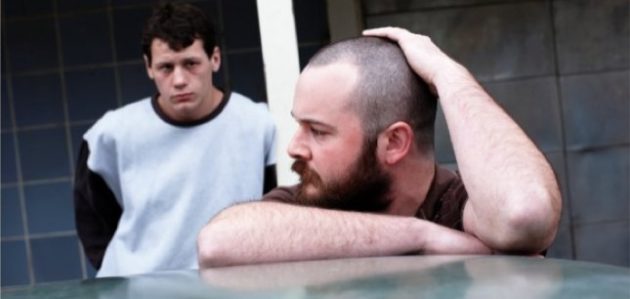REVIEW: An Unassuming Monster Works His Gruesome Magic in Compelling Snowtown Murders

With his round, bearded face and gentle voice, John Bunting (Daniel Henshall) is an unassuming monster — it takes a while to spot the terrible danger within him. In Justin Kurzel's The Snowtown Murders, based on an actual series of gruesome crimes that took place in South Australia in the mid '90s, he's the deceptive mastermind behind a string of serial killings, the leader of a group initially, at least in their own heads, bound together by a desire to enact vigilante justice.
The Snowtown Murders is the latest and bleakest in a string of Australian crime films showing flashes of virtuoso talent, and has more than a little in common with David Michôd's 2010 hit Animal Kingdom, including a near-feral group of characters and a teenage boy whose eyes are the windows through which we see terrible things. But Jamie Vlassakis (Lucas Pittaway) isn't just a witness, he's an eventual participant, and The Snowtown Murders builds into a multipronged horror effort in which the torture and murder on-screen are matched by the psychologically convincing disintegration of a previously sympathetic protagonist.
The film is set in shabby suburbs near Adelaide, the downtrodden ugliness existing in contrast to the giant sky and empty landscapes outside that the camera occasionally pulls back to appreciate. Elizabeth (Louise Harris) is dating a guy who lives across the way, and leaves her boys, including Jamie, in his care. He uses the opportunity to take photos of them in their underwear, a request to which they acquiesce with a defeated air that becomes the film's overarching sentiment. He's out on bail in a day. Later, another character is raped by someone in his own family: He struggles, but eventually surrenders, lying still like the runt of a litter being forced to submit, the camera observing dispassionately from a distance as it happens. The residents of Snowtown seem to have accepted victimhood as their due, which is why John's arrival is so initially welcome — he's willing to fight back, even if it's against the law, and he's charismatic and funny and able to manipulate the welling rage just underneath the benumbed expressions of his followers.
John inveigles his way into Elizabeth's life romantically, and works a different sort of seduction on Jamie, whose hunger for a father figure is almost a physical manifestation. Signs that something's not quite right with John surface slowly — he chops up kangaroos to toss on the doorstep of Elizabeth's pedophilic ex, and later pressures Jamie into shooting his dog as proof of his ability to stand up for himself. The Snowtown Murders internalizes the themes about dominance and survival that Animal Kingdom has to make explicit — the only way to see John's serial killing team is as a predatory pack over which he holds complete sway, their actions motivated by self-importance, by a need to belong, by fear and, eventually, enjoyment. John initially cloaks his actions as justice, primarily against molesters of children — the neighborhood enjoys gathering around a table to smoke and drink and talk about what they'd do to anyone they caught messing with their offspring, the imagining of violence a dizzying pleasure. "It's not fucking mean if you kick the shit out of some diseased prick," John points out. "He fucking deserves it. It's an Australian fucking tradition."
But the killings expand from pedophiles to anyone John deems unworthy — the obese, the drug-addicted, the weak, the unmissable, and John brings Jamie into the fold, forcing the knowledge of what's happening onto him, certain he'll participate. ("I'm only looking after you, mate," he tells the boy after revealing to him that he's murdered one of his friends.) One of the film's best, most difficult scenes finds Jamie watching as someone is chained to the bathtub, walking away, returning to see him get tortured, and going outside to sit as kids ride by on bikes. There's nothing physically holding him there, but he can't and won't intervene or run for help, and so instead he gives in, buying into the illusion of power in what's really just more powerlessness.
The intentional unpleasantness of The Snowtown Murders isn't just due to its violence, but its harsh assessment of human nature, of how its characters' unhappiness grows though they continue on the path they've chosen, too forceless to remedy the situation. The film is unflinching, but doesn't sensationalize its content, which makes it all the more disturbing. In the blue-tinged world it portrays — wood-paneled rooms filled with cigarette smoke, decrepit couches on lawns and porches, a land of dead ends — it's the dreadful normalizing of its crimes that's haunting, the way they go undiscussed even as they grow and pull in everyone around, either as victim, victimizer or accomplice, helpless in the face of a soft-spoken psychopath.
Follow Alison Willmore on Twitter.
Follow Movieline on Twitter.

Comments
Just need to make a few corrections on this review, Snowtown is a township outside of Adelaide, probably and hours drive or so.
The film is based predominantly in a northern Adelaide suburb, I suspect between Salisbury and Smithfield Plains. These areas are well known for public housing where life is quite desparate, and still is.
Snowtown does not enter the movie until the final five minutes however it is an integral role in the murders.
Sorry to be a stickler.
I was just about to say the same thing.
I also live in government housing (industrial town north west of Adelaide)and since the 90's yeah - super depressing. They could have shot the film in my street and used my neighbours as cast members....